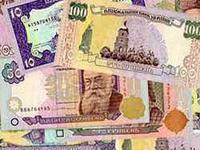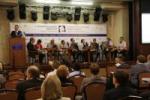- عربي
- Ukraine
- Economy
-
Investment
- Current Investment Trends
- Legal Conditions of Doing Business
- Investment Policy
- Competition
- Setting a Business in Ukraine
- Mergers and Acquisitions
- Taxation
- Import and Export
- Banks and Bank Regulation
- Convertibility and Profits Repatriation
- Currency Regulation
- Protection of Intellectual Property Rights
- Companies
- Travel to Ukraine
- About us
- Useful Sites
- Gallery
- News
Currency rates in UAH
| AED | ||
| BHD | ||
| EGP | ||
| KWD | ||
| LBP | ||
| OMR | ||
| QAR | ||
| SAR | ||
| SYP |
2015-07-06
| Kiev |  |
+32 |
| Donetsk |  |
+28 |
| Dnipropetrovsk |  |
+31 |
| Lviv |  |
+31 |
| Odessa |  |
+27 |
Currency Regulation
In 1992, Ukraine introduced as its temporary currency the karbovanets (commonly referred to as the "coupon"), which resulted in Ukraine, effectively ceasing to be a member of the rouble zone of the former Soviet Union. It was anticipated that after several announcements a new currency, the "hryvnia" has been finally introduced in 1997.
The situation of banks in Ukraine is exceptionally challenging for a number of reasons: the country has not managed to recover from the 2008–2009 crisis before being hit again in 2014. The deep Ukrainian recession and the plunge of the hryvnia together with strong exposure to geopolitical tensions tipped the banking sector again deeply into the red and created an environment of persistent uncertainty. Many foreign-owned banks have left the country. In addition to chronic structural shortcomings like weak rule of law and protection of creditor rights or excessively high corruption and opaque ownership structures, the most significant problems that are currently plaguing the sector include high and growing credit risk and high exchange rate risk. The country is subject to a dramatic credit crunch and to even larger deposit outflows. Financial intermediation has practically collapsed. The number of insolvent banks is quickly rising. The major shock-absorbing factor is the IMF’s and the international community’s ongoing commitment to financially assist Ukraine.
In recent years, Ukraine has repeatedly witnessed tendencies toward political polarization and instability. Society has been dominated by politically powerful domestic businessmen (oligarchs) and financial-industrial groups; society has featured a very high level of corruption and capture of public institutions. 1 Over time, the country and its business groups seem to have come increasingly into the field of geopolitical competition of the EU/ the West versus Russia. The ouster of former President Yanukovich in February 2014 by the strongly pro-EU and pro-Western Euro-Maidan popular movement was followed by Russia’s annexation of Crimea and by the outbreak of armed insurgency in the Donbass region of eastern Ukraine, supported by Russia. While the receipt of IMF and international financial assistance and the presidential elections of May 2014, as well as President Poroshenko’s assumption of office (temporarily) stabilized the situation, the intensification of the armed conflict in the summer 2014 as well as internal political squabbles destabilized the situation again. While the parliamentary elections in October gave the new government a strong mandate to carry out reforms, the overall problematic geopolitical situation has not changed
Over the last year Ukraine has experienced continuing downward pressure on its national currency, the Hryvnia, resulting from the ongoing military intervention in the Eastern regions. To stabilise the situation the National Bank of Ukraine (the "NBU") continues to take restrictive measures. On 23 February 2015, the NBU issued Regulation No. 124 "On Peculiarities of Certain Foreign Currency Transactions", as amended on 24 February 2015. The Regulation came into force on 24 February 2015. The Regulation envisages strengthening control over foreign currency transactions carried out by importers under foreign economic contracts that provide for advance payments. The NBU expects the Regulation to prevent capital outflow from Ukraine and thus decrease the pressure on the Ukrainian foreign exchange market.
The Regulation has a direct and immediate impact on Ukrainian importers, as well as enterprises that use imported goods for production purposes. The restrictions affect the companies’ ability to fulfil their payment obligations towards foreign counterparties under import contracts and thus may lead to disruptions in delivery schedules and decrease the scope of supplies and hence production. Consequently, it is likely to lead to additional expenses for businesses, including due to the daily growth of the FX rate, as well as possible contractual penalties for importers. It may also result in the need to renegotiate contracts.
Under the Regulation (up to and including 5 May 2016):
1. Without confirmation (consent) from the NBU, authorised banks are prohibited from carrying out advance payments in foreign currency for the import of goods under foreign economic contracts ("Advance Payments"), if the total value of such contract exceeds USD 50,000 (or the equivalent thereof in another foreign currency at the official exchange rate of Ukrainian Hryvnia to the foreign currencies, set by the NBU on the date of such contract). Authorised banks shall generate a register of the requested Advance Payments (the "Register") in order for the NBU to confirm them. The Register shall be submitted to the NBU by email together with scanned copies of the documents serving as a basis for the Advance Payments. Authorised banks may carry out those Advance Payments confirmed by the NBU not earlier than on the fourth business day from the day the Register was submitted to the NBU.
2. No NBU confirmation is required if an Advance Payment (irrespective of the total amount of a contract) is to be made using a documentary letter of credit. The letter of credit shall be confirmed by a first rate bank with a rate no lower than the investment rate, assigned by one of the major credit rating agencies (Fitch IBCA, Standard & Poor’s, Moody’s). The letters of credit should be mandatorily used in relation to Advance Payments under foreign economic contracts which exceed the value of USD 500,000. The foreign currency may be purchased only for the purpose of securing the letter of credit.
If no total value of a contract is set therein or with respect to existing contracts, the above limits shall apply in relation to Advance Payments to be made after the effective date of the Regulation.
3. Authorised banks are prohibited from purchasing foreign currency on a client’s instructions using UAH funds borrowed by the client.
The Regulation does not provide for any period of its validity, thus will apply until it is cancelled by the NBU.
Legislation: NBU Regulation “On Peculiarities of Certain Foreign Currency Transactions” No. 124 dated 23 February 2015
On 3 March 2016, the National Bank of Ukraine (hereinafter, the “NBU”) published a decree that regulates currency restrictions in Ukraine (Decree No. 140 dated 3 March 2016). The Decree took effect on 5 March 2016.
According to the Decree, up to and including 5 May 2016:
1. The following restrictions are extended:
If a request is equal to or exceeds USD 50,000, banks should submit, along with the register, copies of documents based on which forex transactions are performed. At that, the NBU developed a list of additional documents, such as a certificate of no arrears issued by the State Fiscal Service, a certificate of the National Committee of Securities and Stock Market confirming non-fictitious nature of transactions involving purchase and/or transfer of foreign currency received from the sale of debt securities by a foreign investor in the stock market, etc.
From 4 March 2015, the Decree of the NBU No.161 dated 3 March 2015 that amends the Decree No.124 dated 23 February 2015 and Decree No.597 dated 30 December 2003 also takes effect.
Under the Decree No.161:
The NBU did not change its policy on the foreign exchange market in the first half of 2015. On the one hand, the regulator did not lift any of the restrictions introduced earlier to stabilize the market. On the other hand, it extensively cut the requests from banks for foreign exchange purchases on the interbank foreign exchange market. At the same time, contrary to expectations, the NBU was not active as a player on the interbank foreign exchange market in May. The regulator made several two-way interventions a t the beginning of the month but the traded amounts were not very high. It also made several “verbal” interventions, announcing its target exchange rate at the beginning of the trading sessions. Starting from the second half of the month, the National Bank stopped making even “verbal” interventions.
Typically for Ukraine, most businesses were on Christmas holidays until January 13th, 2016. Therefore, demand for US dollar was low on the interbank forex market. As a result, the USD/UAH exchange rate appreciated from around 24 UAH/USD to around 23.1 UAH/USD during the first two weeks of the year. The last couple of trading sessions in January were characterized by faster pace of depreciation as the NBU announced its plans of the FX market liberalization and stopped intervening into trade on the interbank forex market (the regulator ceased holding the FX auctions and continued to cut only obvious speculative requests for dollar purchases).
The National Bank carried on with liberalization of its foreign exchange regulations. In particular, the regulator increased the limits for foreign currency and banking metals cash withdrawals bank clients’ accounts from the equivalent of UAH 15 thousand to UAH 50 thousand per day. The limits for national currency cash withdrawals were increased from UAH 150 thousand to UAH 500 thousand per day. The maximum amount of foreign currency cash allowed for sale was doubled to the equivalent of UAH 6 thousand. These changes are meant to regain the trust of the population towards the banking system and to stimulate inflow of deposits in both national and foreign currency. Operation of exporters’ surrender of forex proceeds was extended, as was the ban for early repayment of foreign currency loans by residents under agreements with non-residents and some other foreign exchange restrictions were also introduced.
Forecast for the exchange rate at the end of 2016 is at 25-30 UAH/USD.
The situation of banks in Ukraine is exceptionally challenging for a number of reasons: the country has not managed to recover from the 2008–2009 crisis before being hit again in 2014. The deep Ukrainian recession and the plunge of the hryvnia together with strong exposure to geopolitical tensions tipped the banking sector again deeply into the red and created an environment of persistent uncertainty. Many foreign-owned banks have left the country. In addition to chronic structural shortcomings like weak rule of law and protection of creditor rights or excessively high corruption and opaque ownership structures, the most significant problems that are currently plaguing the sector include high and growing credit risk and high exchange rate risk. The country is subject to a dramatic credit crunch and to even larger deposit outflows. Financial intermediation has practically collapsed. The number of insolvent banks is quickly rising. The major shock-absorbing factor is the IMF’s and the international community’s ongoing commitment to financially assist Ukraine.
In recent years, Ukraine has repeatedly witnessed tendencies toward political polarization and instability. Society has been dominated by politically powerful domestic businessmen (oligarchs) and financial-industrial groups; society has featured a very high level of corruption and capture of public institutions. 1 Over time, the country and its business groups seem to have come increasingly into the field of geopolitical competition of the EU/ the West versus Russia. The ouster of former President Yanukovich in February 2014 by the strongly pro-EU and pro-Western Euro-Maidan popular movement was followed by Russia’s annexation of Crimea and by the outbreak of armed insurgency in the Donbass region of eastern Ukraine, supported by Russia. While the receipt of IMF and international financial assistance and the presidential elections of May 2014, as well as President Poroshenko’s assumption of office (temporarily) stabilized the situation, the intensification of the armed conflict in the summer 2014 as well as internal political squabbles destabilized the situation again. While the parliamentary elections in October gave the new government a strong mandate to carry out reforms, the overall problematic geopolitical situation has not changed
Over the last year Ukraine has experienced continuing downward pressure on its national currency, the Hryvnia, resulting from the ongoing military intervention in the Eastern regions. To stabilise the situation the National Bank of Ukraine (the "NBU") continues to take restrictive measures. On 23 February 2015, the NBU issued Regulation No. 124 "On Peculiarities of Certain Foreign Currency Transactions", as amended on 24 February 2015. The Regulation came into force on 24 February 2015. The Regulation envisages strengthening control over foreign currency transactions carried out by importers under foreign economic contracts that provide for advance payments. The NBU expects the Regulation to prevent capital outflow from Ukraine and thus decrease the pressure on the Ukrainian foreign exchange market.
The Regulation has a direct and immediate impact on Ukrainian importers, as well as enterprises that use imported goods for production purposes. The restrictions affect the companies’ ability to fulfil their payment obligations towards foreign counterparties under import contracts and thus may lead to disruptions in delivery schedules and decrease the scope of supplies and hence production. Consequently, it is likely to lead to additional expenses for businesses, including due to the daily growth of the FX rate, as well as possible contractual penalties for importers. It may also result in the need to renegotiate contracts.
Under the Regulation (up to and including 5 May 2016):
1. Without confirmation (consent) from the NBU, authorised banks are prohibited from carrying out advance payments in foreign currency for the import of goods under foreign economic contracts ("Advance Payments"), if the total value of such contract exceeds USD 50,000 (or the equivalent thereof in another foreign currency at the official exchange rate of Ukrainian Hryvnia to the foreign currencies, set by the NBU on the date of such contract). Authorised banks shall generate a register of the requested Advance Payments (the "Register") in order for the NBU to confirm them. The Register shall be submitted to the NBU by email together with scanned copies of the documents serving as a basis for the Advance Payments. Authorised banks may carry out those Advance Payments confirmed by the NBU not earlier than on the fourth business day from the day the Register was submitted to the NBU.
2. No NBU confirmation is required if an Advance Payment (irrespective of the total amount of a contract) is to be made using a documentary letter of credit. The letter of credit shall be confirmed by a first rate bank with a rate no lower than the investment rate, assigned by one of the major credit rating agencies (Fitch IBCA, Standard & Poor’s, Moody’s). The letters of credit should be mandatorily used in relation to Advance Payments under foreign economic contracts which exceed the value of USD 500,000. The foreign currency may be purchased only for the purpose of securing the letter of credit.
If no total value of a contract is set therein or with respect to existing contracts, the above limits shall apply in relation to Advance Payments to be made after the effective date of the Regulation.
3. Authorised banks are prohibited from purchasing foreign currency on a client’s instructions using UAH funds borrowed by the client.
The Regulation does not provide for any period of its validity, thus will apply until it is cancelled by the NBU.
Legislation: NBU Regulation “On Peculiarities of Certain Foreign Currency Transactions” No. 124 dated 23 February 2015
On 3 March 2016, the National Bank of Ukraine (hereinafter, the “NBU”) published a decree that regulates currency restrictions in Ukraine (Decree No. 140 dated 3 March 2016). The Decree took effect on 5 March 2016.
According to the Decree, up to and including 5 May 2016:
1. The following restrictions are extended:
- settlement deadline for import and export transactions remains limited to 90 calendar days;
- mandatory sale of 75% of foreign currency earnings (with limited exceptions);
- tightened control over currency transactions (including the prohibition on discontinuance of supervision over export operations on the grounds of documents confirming the discharge of obligations through the offset of similar counterclaims);
- ban on early repayment of loans, credits in foreign currency under agreements/contracts with non-residents;
- sale of foreign currency cash to one individual on one business day in one banking institution remains restricted to the equivalent of UAH 6,000 (previously - 3,000 until the 5th of March 2015);
- foreign currency remittances by individuals from Ukraine abroad remain limited to the equivalent of UAH 15,000 on one business day in case of transfers without supporting documents, and to the equivalent of UAH 150,000 per month in case of remittances made on the grounds of supporting documents;
- cash withdrawals through cash desks and ATMs are limited to UAH 500,000 per day per client (previously - 150,000 until the 5th of March 2015);
- prohibition on cash withdrawals within Ukraine by electronic payment instruments issued both by residents and non-residents in any currency other than Ukrainian hryvnia;
- total long term foreign currency exposure of banks (H13-1) is limited to 1%;
- cash withdrawals in foreign currency or precious metals from current and deposit accounts of clients remain limited to the equivalent of UAH 50,000 (at the official exchange rate of the National Bank of Ukraine) per day per client (previously - 15,000 until the 5th of March 2015);
- banks are allowed to issue registered savings (deposit) certificates denominated both in the national and foreign currencies, with a maturity of not less than six months; however, the banks should suspend the issue of bearer savings (deposit) certificates;
- right of banks to return ahead of schedule any foreign currency deposits (except deposits confirmed by savings (deposit) certificates with a maturity of not less than six months) in Ukrainian hryvnia at the forex purchase rate set by the respective bank as of the day of transaction;
- obligation of banks to include the book value of purchased government domestic bonds, along with the indexed value reduced by the coupon, in the calculation of the total foreign currency exposure;
- obligation of banks to place funds in hryvnia to a separate analytical account first and transfer such funds for the purposes of purchasing foreign currency no sooner than the fourth banking day;
- obligation of banks to keep a foreign currency purchase register that shall be submitted to the NBU.
If a request is equal to or exceeds USD 50,000, banks should submit, along with the register, copies of documents based on which forex transactions are performed. At that, the NBU developed a list of additional documents, such as a certificate of no arrears issued by the State Fiscal Service, a certificate of the National Committee of Securities and Stock Market confirming non-fictitious nature of transactions involving purchase and/or transfer of foreign currency received from the sale of debt securities by a foreign investor in the stock market, etc.
From 4 March 2015, the Decree of the NBU No.161 dated 3 March 2015 that amends the Decree No.124 dated 23 February 2015 and Decree No.597 dated 30 December 2003 also takes effect.
Under the Decree No.161:
- The set of documents submitted to the NBU in order to confirm possibility of foreign currency purchase or sale should also include a certificate of no arrears in taxes, charges and payments issued by the State Fiscal Service of Ukraine and, in some cases, a respective cost examination certificate issued by the State Information and Analytical Center for Monitoring International Commodity Markets.
- The threshold for obligatory cost examination by the State Information and Analytical Center for Monitoring International Commodity Markets, introduced by the Decree of the NBU No.597 dated 30 December 2003, has been reduced to the equivalent of EUR 25,000.
- In accordance with the Law of Ukraine “On measures concerning stabilization of the balance of payments of Ukraine in compliance with Article XII of the General Agreement on Tariffs and Trade 1994”, a requirement to use letters of credit for payments under import contracts with the total value over USD 500,000 does not apply to purchases of essential goods until 3 April 2015.
The NBU did not change its policy on the foreign exchange market in the first half of 2015. On the one hand, the regulator did not lift any of the restrictions introduced earlier to stabilize the market. On the other hand, it extensively cut the requests from banks for foreign exchange purchases on the interbank foreign exchange market. At the same time, contrary to expectations, the NBU was not active as a player on the interbank foreign exchange market in May. The regulator made several two-way interventions a t the beginning of the month but the traded amounts were not very high. It also made several “verbal” interventions, announcing its target exchange rate at the beginning of the trading sessions. Starting from the second half of the month, the National Bank stopped making even “verbal” interventions.
Typically for Ukraine, most businesses were on Christmas holidays until January 13th, 2016. Therefore, demand for US dollar was low on the interbank forex market. As a result, the USD/UAH exchange rate appreciated from around 24 UAH/USD to around 23.1 UAH/USD during the first two weeks of the year. The last couple of trading sessions in January were characterized by faster pace of depreciation as the NBU announced its plans of the FX market liberalization and stopped intervening into trade on the interbank forex market (the regulator ceased holding the FX auctions and continued to cut only obvious speculative requests for dollar purchases).
The National Bank carried on with liberalization of its foreign exchange regulations. In particular, the regulator increased the limits for foreign currency and banking metals cash withdrawals bank clients’ accounts from the equivalent of UAH 15 thousand to UAH 50 thousand per day. The limits for national currency cash withdrawals were increased from UAH 150 thousand to UAH 500 thousand per day. The maximum amount of foreign currency cash allowed for sale was doubled to the equivalent of UAH 6 thousand. These changes are meant to regain the trust of the population towards the banking system and to stimulate inflow of deposits in both national and foreign currency. Operation of exporters’ surrender of forex proceeds was extended, as was the ban for early repayment of foreign currency loans by residents under agreements with non-residents and some other foreign exchange restrictions were also introduced.
Forecast for the exchange rate at the end of 2016 is at 25-30 UAH/USD.




